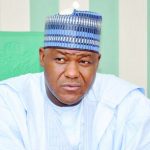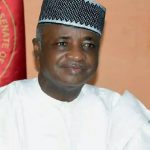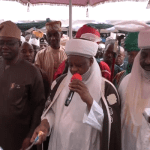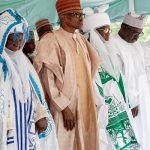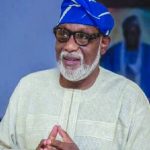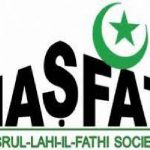Despite the challenging economic situation in the country, Muslim faithful across the northwest states happily marked the 2024 Eid El-Kabir festival, the Islamic feast of sacrifice.
The need to deeply reflect on the lessons of the celebration which include sacrifice, love, peace and harmony was echoed by governors and Islamic clerics.
The early morning rain in some northwest states was seen as a sign of blessing as Muslim faithful marked the Islamic feast of sacrifice.
The festival honors prophet Ibrahim’s selflessness and willingness to sacrifice his son in obedience to God.
In commemoration of this, a ram is usually slaughtered.
In Kaduna, Governor Senator Uba Sani, observed his Eid prayers alongside other Muslim faithful at Sultan Bello Mosque.
After the prayer, the Governor urged people to pray for the continued peace enjoyed in the state and in Nigeria at large.
Residents of Kano state celebrated Eid-el-Kabir by gathering at various mosques for the two ra’akat prayers.
The 15th and 16th Emirs of Kano, Aminu Bayero and Muhammadu Sanusi II, prayed at different mosques within the state.
Governor Abba Yusuf, who prayed at Kofar Mata mosque with the 16th Emir, called for calm and prayers for state peace.
Deputy Senate President Barau Jibrin, who prayed in Kabo, urged Nigerians to support President Bola Tinubu’s administration for the country’s development.
Muslims in Katsina state celebrated Eid el Kabir peacefully, as some people managed to buy sacrificial animals due to its high price.
Worshippers gathered for prayers, seeking Allah’s favors and solutions to national problems.
The chief imam emphasised repentance and lawfulness. Worshippers noted the impact of economic hardships on the festivities.
One thing was common across all prayer grounds in the region: the need for peace and tolerance was preached.
Despite the challenging economic situation in the country, Muslim faithful across the northwest states happily marked the 2024 Eid El-Kabir festival, the Islamic feast of sacrifice.
The need to deeply reflect on the lessons of the celebration which include sacrifice, love, peace and harmony was echoed by governors and Islamic clerics.
The early morning rain in some northwest states was seen as a sign of blessing as Muslim faithful marked the Islamic feast of sacrifice.
The festival honors prophet Ibrahim’s selflessness and willingness to sacrifice his son in obedience to God.
In commemoration of this, a ram is usually slaughtered.
In Kaduna, Governor Senator Uba Sani, observed his Eid prayers alongside other Muslim faithful at Sultan Bello Mosque.
After the prayer, the Governor urged people to pray for the continued peace enjoyed in the state and in Nigeria at large.
Residents of Kano state celebrated Eid-el-Kabir by gathering at various mosques for the two ra’akat prayers.
The 15th and 16th Emirs of Kano, Aminu Bayero and Muhammadu Sanusi II, prayed at different mosques within the state.
Governor Abba Yusuf, who prayed at Kofar Mata mosque with the 16th Emir, called for calm and prayers for state peace.
Deputy Senate President Barau Jibrin, who prayed in Kabo, urged Nigerians to support President Bola Tinubu’s administration for the country’s development.
Muslims in Katsina state celebrated Eid el Kabir peacefully, as some people managed to buy sacrificial animals due to its high price.
Worshippers gathered for prayers, seeking Allah’s favors and solutions to national problems.
The chief imam emphasised repentance and lawfulness. Worshippers noted the impact of economic hardships on the festivities.
One thing was common across all prayer grounds in the region: the need for peace and tolerance was preached.
Despite the challenging economic situation in the country, Muslim faithful across the northwest states happily marked the 2024 Eid El-Kabir festival, the Islamic feast of sacrifice.
The need to deeply reflect on the lessons of the celebration which include sacrifice, love, peace and harmony was echoed by governors and Islamic clerics.
The early morning rain in some northwest states was seen as a sign of blessing as Muslim faithful marked the Islamic feast of sacrifice.
The festival honors prophet Ibrahim’s selflessness and willingness to sacrifice his son in obedience to God.
In commemoration of this, a ram is usually slaughtered.
In Kaduna, Governor Senator Uba Sani, observed his Eid prayers alongside other Muslim faithful at Sultan Bello Mosque.
After the prayer, the Governor urged people to pray for the continued peace enjoyed in the state and in Nigeria at large.
Residents of Kano state celebrated Eid-el-Kabir by gathering at various mosques for the two ra’akat prayers.
The 15th and 16th Emirs of Kano, Aminu Bayero and Muhammadu Sanusi II, prayed at different mosques within the state.
Governor Abba Yusuf, who prayed at Kofar Mata mosque with the 16th Emir, called for calm and prayers for state peace.
Deputy Senate President Barau Jibrin, who prayed in Kabo, urged Nigerians to support President Bola Tinubu’s administration for the country’s development.
Muslims in Katsina state celebrated Eid el Kabir peacefully, as some people managed to buy sacrificial animals due to its high price.
Worshippers gathered for prayers, seeking Allah’s favors and solutions to national problems.
The chief imam emphasised repentance and lawfulness. Worshippers noted the impact of economic hardships on the festivities.
One thing was common across all prayer grounds in the region: the need for peace and tolerance was preached.
Despite the challenging economic situation in the country, Muslim faithful across the northwest states happily marked the 2024 Eid El-Kabir festival, the Islamic feast of sacrifice.
The need to deeply reflect on the lessons of the celebration which include sacrifice, love, peace and harmony was echoed by governors and Islamic clerics.
The early morning rain in some northwest states was seen as a sign of blessing as Muslim faithful marked the Islamic feast of sacrifice.
The festival honors prophet Ibrahim’s selflessness and willingness to sacrifice his son in obedience to God.
In commemoration of this, a ram is usually slaughtered.
In Kaduna, Governor Senator Uba Sani, observed his Eid prayers alongside other Muslim faithful at Sultan Bello Mosque.
After the prayer, the Governor urged people to pray for the continued peace enjoyed in the state and in Nigeria at large.
Residents of Kano state celebrated Eid-el-Kabir by gathering at various mosques for the two ra’akat prayers.
The 15th and 16th Emirs of Kano, Aminu Bayero and Muhammadu Sanusi II, prayed at different mosques within the state.
Governor Abba Yusuf, who prayed at Kofar Mata mosque with the 16th Emir, called for calm and prayers for state peace.
Deputy Senate President Barau Jibrin, who prayed in Kabo, urged Nigerians to support President Bola Tinubu’s administration for the country’s development.
Muslims in Katsina state celebrated Eid el Kabir peacefully, as some people managed to buy sacrificial animals due to its high price.
Worshippers gathered for prayers, seeking Allah’s favors and solutions to national problems.
The chief imam emphasised repentance and lawfulness. Worshippers noted the impact of economic hardships on the festivities.
One thing was common across all prayer grounds in the region: the need for peace and tolerance was preached.
Despite the challenging economic situation in the country, Muslim faithful across the northwest states happily marked the 2024 Eid El-Kabir festival, the Islamic feast of sacrifice.
The need to deeply reflect on the lessons of the celebration which include sacrifice, love, peace and harmony was echoed by governors and Islamic clerics.
The early morning rain in some northwest states was seen as a sign of blessing as Muslim faithful marked the Islamic feast of sacrifice.
The festival honors prophet Ibrahim’s selflessness and willingness to sacrifice his son in obedience to God.
In commemoration of this, a ram is usually slaughtered.
In Kaduna, Governor Senator Uba Sani, observed his Eid prayers alongside other Muslim faithful at Sultan Bello Mosque.
After the prayer, the Governor urged people to pray for the continued peace enjoyed in the state and in Nigeria at large.
Residents of Kano state celebrated Eid-el-Kabir by gathering at various mosques for the two ra’akat prayers.
The 15th and 16th Emirs of Kano, Aminu Bayero and Muhammadu Sanusi II, prayed at different mosques within the state.
Governor Abba Yusuf, who prayed at Kofar Mata mosque with the 16th Emir, called for calm and prayers for state peace.
Deputy Senate President Barau Jibrin, who prayed in Kabo, urged Nigerians to support President Bola Tinubu’s administration for the country’s development.
Muslims in Katsina state celebrated Eid el Kabir peacefully, as some people managed to buy sacrificial animals due to its high price.
Worshippers gathered for prayers, seeking Allah’s favors and solutions to national problems.
The chief imam emphasised repentance and lawfulness. Worshippers noted the impact of economic hardships on the festivities.
One thing was common across all prayer grounds in the region: the need for peace and tolerance was preached.
Despite the challenging economic situation in the country, Muslim faithful across the northwest states happily marked the 2024 Eid El-Kabir festival, the Islamic feast of sacrifice.
The need to deeply reflect on the lessons of the celebration which include sacrifice, love, peace and harmony was echoed by governors and Islamic clerics.
The early morning rain in some northwest states was seen as a sign of blessing as Muslim faithful marked the Islamic feast of sacrifice.
The festival honors prophet Ibrahim’s selflessness and willingness to sacrifice his son in obedience to God.
In commemoration of this, a ram is usually slaughtered.
In Kaduna, Governor Senator Uba Sani, observed his Eid prayers alongside other Muslim faithful at Sultan Bello Mosque.
After the prayer, the Governor urged people to pray for the continued peace enjoyed in the state and in Nigeria at large.
Residents of Kano state celebrated Eid-el-Kabir by gathering at various mosques for the two ra’akat prayers.
The 15th and 16th Emirs of Kano, Aminu Bayero and Muhammadu Sanusi II, prayed at different mosques within the state.
Governor Abba Yusuf, who prayed at Kofar Mata mosque with the 16th Emir, called for calm and prayers for state peace.
Deputy Senate President Barau Jibrin, who prayed in Kabo, urged Nigerians to support President Bola Tinubu’s administration for the country’s development.
Muslims in Katsina state celebrated Eid el Kabir peacefully, as some people managed to buy sacrificial animals due to its high price.
Worshippers gathered for prayers, seeking Allah’s favors and solutions to national problems.
The chief imam emphasised repentance and lawfulness. Worshippers noted the impact of economic hardships on the festivities.
One thing was common across all prayer grounds in the region: the need for peace and tolerance was preached.
Despite the challenging economic situation in the country, Muslim faithful across the northwest states happily marked the 2024 Eid El-Kabir festival, the Islamic feast of sacrifice.
The need to deeply reflect on the lessons of the celebration which include sacrifice, love, peace and harmony was echoed by governors and Islamic clerics.
The early morning rain in some northwest states was seen as a sign of blessing as Muslim faithful marked the Islamic feast of sacrifice.
The festival honors prophet Ibrahim’s selflessness and willingness to sacrifice his son in obedience to God.
In commemoration of this, a ram is usually slaughtered.
In Kaduna, Governor Senator Uba Sani, observed his Eid prayers alongside other Muslim faithful at Sultan Bello Mosque.
After the prayer, the Governor urged people to pray for the continued peace enjoyed in the state and in Nigeria at large.
Residents of Kano state celebrated Eid-el-Kabir by gathering at various mosques for the two ra’akat prayers.
The 15th and 16th Emirs of Kano, Aminu Bayero and Muhammadu Sanusi II, prayed at different mosques within the state.
Governor Abba Yusuf, who prayed at Kofar Mata mosque with the 16th Emir, called for calm and prayers for state peace.
Deputy Senate President Barau Jibrin, who prayed in Kabo, urged Nigerians to support President Bola Tinubu’s administration for the country’s development.
Muslims in Katsina state celebrated Eid el Kabir peacefully, as some people managed to buy sacrificial animals due to its high price.
Worshippers gathered for prayers, seeking Allah’s favors and solutions to national problems.
The chief imam emphasised repentance and lawfulness. Worshippers noted the impact of economic hardships on the festivities.
One thing was common across all prayer grounds in the region: the need for peace and tolerance was preached.
Despite the challenging economic situation in the country, Muslim faithful across the northwest states happily marked the 2024 Eid El-Kabir festival, the Islamic feast of sacrifice.
The need to deeply reflect on the lessons of the celebration which include sacrifice, love, peace and harmony was echoed by governors and Islamic clerics.
The early morning rain in some northwest states was seen as a sign of blessing as Muslim faithful marked the Islamic feast of sacrifice.
The festival honors prophet Ibrahim’s selflessness and willingness to sacrifice his son in obedience to God.
In commemoration of this, a ram is usually slaughtered.
In Kaduna, Governor Senator Uba Sani, observed his Eid prayers alongside other Muslim faithful at Sultan Bello Mosque.
After the prayer, the Governor urged people to pray for the continued peace enjoyed in the state and in Nigeria at large.
Residents of Kano state celebrated Eid-el-Kabir by gathering at various mosques for the two ra’akat prayers.
The 15th and 16th Emirs of Kano, Aminu Bayero and Muhammadu Sanusi II, prayed at different mosques within the state.
Governor Abba Yusuf, who prayed at Kofar Mata mosque with the 16th Emir, called for calm and prayers for state peace.
Deputy Senate President Barau Jibrin, who prayed in Kabo, urged Nigerians to support President Bola Tinubu’s administration for the country’s development.
Muslims in Katsina state celebrated Eid el Kabir peacefully, as some people managed to buy sacrificial animals due to its high price.
Worshippers gathered for prayers, seeking Allah’s favors and solutions to national problems.
The chief imam emphasised repentance and lawfulness. Worshippers noted the impact of economic hardships on the festivities.
One thing was common across all prayer grounds in the region: the need for peace and tolerance was preached.




